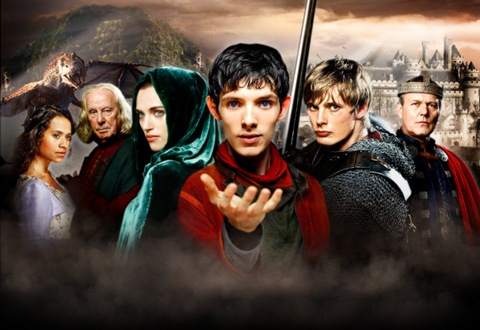“Merlin” is an excellent British (BBC) fantasy series with just the right amount of American sensibilities.
Yesterday, I mentioned our fascination with origin stories. We love to go back and look at a story which we already feel we know, and see different interpretations of the beginning of it.
The story of Arthur and Merlin is one of the oldest tales in our fantastic lexicon. The effect that story has had on the culture of the western world is unsurpassed.

Not even Shakespeare and Chaucer are as widespread and influential, mostly because they only really spread through English speaking areas, while Arthurian legend has its tendrils in almost every romance language.
The legends have been retold hundreds of times, and across many eras, meaning that there is no true or official canon for the stories, which leaves modern writers free to explore the legendary characters as they see fit.
The BBC show, which is currently in its third series (season), is one such retelling, and it does an excellent job.
The producers have admitted that much of their inspiration for the show came from the American series “Smallville,” and the influence is obvious right from the first episode: Merlin is a small town boy coming to Camelot to find his way in life, and to learn how to manage his sorcerous powers.
Some of the classic Merlin traits have been dropped for storytelling purposes. For example, it certainly would have been inconvenient for him to live backward, the only magic power he originally had when he was first seen in the legends.
All of the major characters are teenagers in Uther’s kingdom, and must struggle with teenaged problems, like awkward romance and rebellion from authority, while simultaneously working their way toward a version of their legendary destinies.

I appreciate most the way the series does not treat the aspects of the legends lightly, and nothing happens too quickly. This is something “Smallville” could have done better.
For example, we first see Lancelot in the first series, and his struggle is true to many of the legends. He is a skilled warrior of the peasant class, and though he would very much like to be a knight of Camelot, his request is denied.
Peasants can’t be knights. Rather than toss out the conventions of their world, and the stories verisimilitude with it, by ending the episode with him being granted some kind of exception, he is compelled to leave the kingdom, and has not been yet made a knight, though we know it will happen someday, as Arthur himself contemplates the unfairness of his kingdom’s traditions.
This type of resolution shows us a much more steady world, with more defined and believable rules.
Of course the most obvious link to the Superman stories is that in this version of the tale, Merlin must keep his magical talents a secret from everyone, including Arthur.
His only confidant is his mentor Gaius, a character invented for the show.
Each episode, Merlin must find a way to help his friends without
revealing his nature to them.
This results in familiar, but compelling drama, as he constantly struggles to keep his secret, and the audience is left wondering when Arthur will finally discover the truth, as he surely must do eventually.
The show may have been a bit poorly received by critics when it first appeared, but it is still going strong, with a huge British audience, and I, for one, am eager to see where they take the story next.






